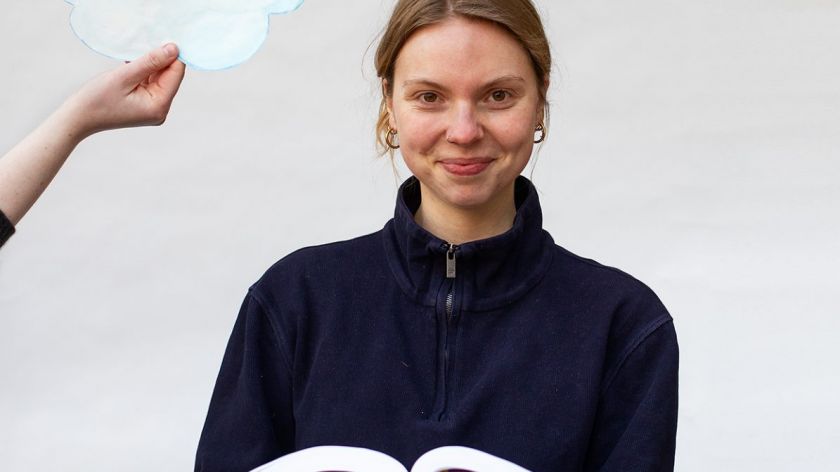Plastic surgery might not be unfeminist after all
-
 Jara Majerus, photo: Dick van Aalst.
Jara Majerus, photo: Dick van Aalst.
Life can get quite complicated - and sometimes, you need help from the world's greatest philosophers to figure it out. In her blog, Jara Majerus looks at life through the philosophical monocle, employing the help of some of history's brightest thinkers. This week, Jara is facing questions of feminist thought – and what plastic surgery has to do with this.
Have you ever looked at yourself and only saw things you would like to change? Maybe my nose is too big; I could get it done to be a bit smaller. Maybe my jawline could be more snatched. Or maybe my face just needs a little lift? If thoughts like these have crossed your mind, you certainly are not alone. The fact that cosmetic surgeries are more popular than ever shows that pretty clearly.
For a long time, I didn’t quite know what to make of cosmetic surgeries. More precisely, I didn’t know what to make of women getting them. Something about women spending tons of money and time to change their appearance and fit a specific type of ‘beauty’ felt wrong.
It is no secret that beauty standards impact the lives of many women negatively and that the beauty industry is profiting big time from female insecurities. By submitting to these beauty standards and making it a priority to do everything possible to fit them, are we not minimizing ourselves?
Second-wave radical feminists would argue that we are. According to them, beautifying the female body only has one goal, namely attracting the male gaze. Every single thing women do to look pretty, whether it is wearing high heels, putting on make-up, or changing one’s nose, is done for the approval of men. Hence, the strive for beauty is deeply entrenched in patriarchal power. Following this idea, cosmetic surgery is thus a disempowering act for women, it is an act of oppression.
‘There is something that bugs me about the idea that female beauty only seeks to attract men’
I have been thinking about this stance a lot recently. I get it. I genuinely believe that through growing up and living in patriarchal societies, patriarchal structures are part of everyone’s thinking. But at the same time, there is something that bugs me about the idea that female beauty only seeks to attract men. Because I also genuinely believe that women can strive for beauty for their own sake. This means that I can put on make-up and wear high heels for myself. It also means that other women can change their nose and get a face-lift if they want to.
In my opinion, this is a matter of all or nothing: either all of beauty is unfeminist or no forms of beautifying are unfeminist. And seeing that I seem to have no problem with painting my nails, I will also have no problem with other women getting plastic surgery if they feel like it.
So, to conclude, caring about our appearance doesn’t make women weak-willed or unfeminist. Beautifying oneself can be an empowering act. Of course, living in a patriarchal society, we do need to question our insecurities as women. It is important to ask ourselves why we are making certain choices and who is profiting from them. But it is equally important to acknowledge women’s free will, self-determination, and personal preferences regarding their bodies and looks.
Read Jara Majerus's blogs here



Eef wrote on 5 september 2024 at 11:55
I do not think you actually understand the point of these radical feminists you argue against.
“According to them, beautifying the female body only has one goal, namely attracting the male gaze. Every single thing women do to look pretty, whether it is wearing high heels, putting on make-up, or changing one’s nose, is done for the approval of men.” This is not true. The argument is one of internalization which means that the appeasal to the male gaze is not explicit or concious, e.g. it is impossible to distinguish the individual want from the societal context. The following sentence is a perfect example of this flawed individualization:
“Because I also genuinely believe that women can strive for beauty for their own sake”. What does it mean to strive for beauty ‘for your own sake’ when your idea of beauty is undeniably and so obviously socially constructed? Why do body shapes and specific plastic surgeries go in and out? Why has globalization lead to the widespread popularization of small, thin ‘Western’ noses, eradicating other previously culturally appreciated features? The idea of beauty you speak of is certainly not inherent or natural, nor is it individual because it largely strives for the same beauty standard.
Besides, your equation of heels and makeup with plastic surgery blatantly ignores the intersection and mutually influential relationship of beauty and class.
Jara Majerus wrote on 5 september 2024 at 17:04
Hi Evi, thank you for your comment and for sharing your critical thoughts here! I do understand internalization and believe that it is correct that beauty standards (amongst other things) have been internalized and shape individual wants – absolutely. However, I personally (!) disagree that it is impossible to distinguish between individual wants and societal context and that is what I tried to argue in this column. Nontheless, I definitely see your point and also value your critique regarding the connection between class, race, and beauty that I have not mentioned in this column.